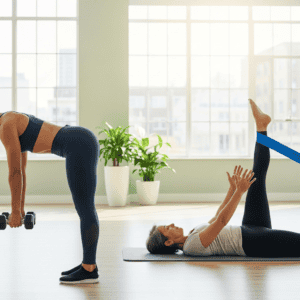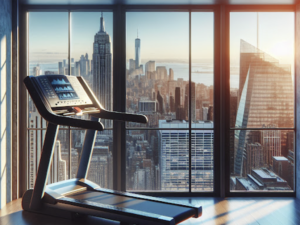Introduction
Let’s face it, hitting the gym or pounding the pavement feels amazing. But have you ever finished a workout feeling sluggish, headache-y, or just…off? It might not be muscle soreness, but your body sending distress signals. The culprit? Dehydration.
Yes, even for us weekend warriors and casual fitness enthusiasts, proper hydration for exercise sessions is crucial for maximizing workouts and feeling fantastic. But between work, errands, and that Netflix show everyone’s talking about, remembering to chug water sometimes feels like another chore. Fear not, fellow fitness friend! This guide is your secret weapon to mastering hydration without feeling like a soggy sponge.
Key Takeaways for Hydration For Exercise Success
- Hydration Matters: It’s not just about avoiding headaches and cramps. Proper hydration fuels peak performance, faster recovery, and overall well-being.
- Ditch the Confusion: Forget complicated calculations. Aim for 17-20 ounces of water 2-3 hours before your workout, 7-10 ounces every 10-20 minutes during, and 16-24 ounces per pound of body weight lost afterwards. Remember, listen to your thirst and adjust as needed.
- Water is Your MVP: For most workouts, water wins! Sports drinks can be helpful for longer, intense sessions or hot environments, but choose low-sugar options or natural flavorings for your water instead.
- Be a Dehydration Detective: Notice increased thirst, fatigue, muscle cramps, dark urine, or headaches? These could be red flags. Listen to your body and address them promptly.
- Make Hydration a Habit: Invest in a reusable water bottle, set reminders, and find ways to make water fun with infusions or frozen fruits. Celebrate small wins and remember, consistency is key!
- Embrace the Power of H2O: Don’t underestimate the transformative power of proper hydration. It’s about unlocking your full potential, both physically and mentally. So, grab your water bottle, embrace the sweat (without drying out!), and conquer your fitness journey, one hydrating sip at a time!
Why Every Drop Counts:
Okay, so you know water is good for you. But why does it matter so much when you’re getting your sweat on? Picture this: your body is like a finely tuned machine. Water acts as the lubricant, keeping everything running smoothly. When you exercise, you sweat (yay!), but that means losing precious fluids. If you don’t replenish them, things start to malfunction.
That’s why dehydration can lead to:
- Reduced performance: Feeling tired, sluggish, or even dizzy mid-workout? Dehydration could be sapping your energy and focus.
- Muscle cramps: Ever had those painful twinges that make you wince? Dehydration can contribute to those unwanted visitors.
- Slower recovery: Want to bounce back from your workout feeling refreshed? Not hydrating enough can hinder your body’s ability to repair and rebuild.
So, staying hydrated isn’t just about feeling good during your workout, it’s about setting yourself up for success both during and after. Next up, we’ll delve into the magic number: how much water you actually need. No complicated formulas, just clear-cut tips for different types of workouts, so you can ditch the confusion and grab that water bottle!
Cracking the Hydration Code: Your Guide to Not-So-Secret Water Wisdom
Alright, you get it: staying hydrated rocks. But the question remains: how much H2O do you actually need? Don’t worry, forget the complex equations and confusing charts. We’re all about keeping it simple and realistic, especially for us non-professional athletes. Here’s the lowdown on how much water to chug based on your workout style:
The Pre-Workout Prep: Priming Your Pump (But Not Your Bladder)
Start your fitness journey on the right foot! Aim to drink 17-20 ounces of water 2-3 hours before you break a sweat. This gives your body ample time to absorb the fluids and set the stage for optimal performance. Don’t forget a quick 8-ounce top-up 20-30 minutes before you lace up your shoes – it’s like a pre-game pep talk for your hydration levels.
The Main Event: Sipping Your Way to Success
Now, you’re in the zone! But chugging gallons during your workout isn’t exactly realistic. Instead, aim for 7-10 ounces of water every 10-20 minutes. Think of it as mini pit stops for your body to refuel and avoid dehydration’s clutches.
Pro Tip: Invest in a water bottle with time markers to ensure you’re sipping consistently throughout your workout.
The Cool-Down and Beyond: Refueling and Repairing
Don’t think your hydration mission ends with the last push-up. Replenishing lost fluids is crucial for recovery. Here’s the magic equation: aim to drink 16-24 ounces of water for every pound of body weight lost during your workout. Don’t worry about weighing yourself; simply focus on drinking 8 ounces of water within 30 minutes of finishing your workout, and continue sipping throughout the day to rehydrate gradually.
Remember, these are general guidelines. Factors like weather, intensity, and individual differences can play a role. Listen to your body! If you’re feeling thirsty, it’s your body’s way of saying “more water, please!”. Don’t ignore its signals.
But wait, there’s more! In the next section, we’ll explore the world of sports drinks and electrolytes: are they magic potions or just fancy water? Read on to find out!
Sports Drinks and Electrolytes: Friend or Foe?
So, you’ve mastered the art of water consumption, high fives all around! But what about those flashy sports drinks lining the gym shelves? Are they a hydration hero or just a marketing ploy? Let’s crack open the truth about electrolytes and their role in your fitness journey:
The Electrolyte Lowdown: What Are They and Why Do They Matter?
Electrolytes are minerals like sodium, potassium, and calcium that help your body function properly. They play a role in muscle function, nerve impulses, and maintaining your body’s fluid balance. When you sweat, you lose some electrolytes alongside water.
But here’s the key: for most of us, with moderate-intensity workouts lasting under an hour, plain water is enough to replenish lost fluids and electrolytes. Your body is pretty good at regulating things on its own!
Sports Drinks: When They Might Be Helpful
However, for intense workouts lasting longer than an hour or in extremely hot environments, sports drinks can offer some additional benefits:
- Faster fluid absorption: They contain carbohydrates that help your body absorb fluids more quickly than water alone.
- Electrolyte replacement: They provide electrolytes that can be helpful for heavy sweating.
But remember:
- Sugar overload: Many sports drinks are packed with sugar, which can contribute to unwanted calories and even dehydration if consumed in excess.
- Not a magic potion: They won’t magically boost your performance if you’re not properly hydrated with water beforehand.
Your Hydration MVP: Water (with a Twist!)
The bottom line? For most amateur athletes, water is your go-to hydration champion. But if you crave variety or engage in extended, intense workouts, consider low-sugar electrolyte drinks as a supplementary option. Remember, listen to your body and choose what works best for you!
Bonus Tip: Want to add some flavor to your water without the sugar bomb? Try infusing it with fruits, herbs, or vegetables like cucumber and mint. Delicious and hydrating!
In the next section, we’ll unveil the tell-tale signs of dehydration so you can catch it before it throws your workout off track. Stay tuned, fitness friend!
Dehydration Detectives: Spotting the Signs Before They Slow You Down
Imagine: you’re crushing your workout, feeling energized and focused. Suddenly, you hit a wall – fatigue sets in, muscles cramp, and your head starts pounding. Dehydration might be the culprit! Don’t let it derail your fitness journey. Let’s become dehydration detectives, learning to recognize the tell-tale signs before they slow you down:
The Visual Clues: Look Beyond the Sweat
While increased sweating during intense workouts is normal, its absence can actually be a red flag. If you’re pushing hard but barely breaking a sweat, it could indicate dehydration. Remember, sweating is your body’s way of cooling itself down, and without enough fluids, it might not be able to function properly.
Another visual clue? Dark-colored urine. Aim for pale yellow or clear urine as a sign of proper hydration.
The Body’s SOS Signals: Listen to Your Internal Alarm
Don’t ignore your body’s whispers (or shouts)! Here are some common physical symptoms of dehydration to watch out for:
- Thirst: While it seems obvious, thirst is your body’s way of saying it needs more fluids. Don’t wait until you’re parched to reach for water!
- Fatigue and dizziness: Feeling tired or lightheaded during or after your workout? Dehydration could be stealing your energy and focus.
- Muscle cramps: Those painful twinges during or after exercise might not just be soreness – they could be dehydration’s unwelcome party guests.
- Headaches: Feeling a dull ache or a throbbing pain in your head? Dehydration can sometimes trigger headaches.
Remember, these are just some of the most common signs. If you experience any unusual symptoms or feel overly concerned, seek professional medical advice.
Beyond the Physical: Dehydration’s Mental Impact
Don’t underestimate the cognitive effects of dehydration. It can impact your concentration, mood, and even reaction time.So, staying hydrated might not just help you crush your workout; it could also boost your brainpower!
In the next section, we’ll wrap up with some practical tips to make staying hydrated throughout your workout a breeze.Let’s turn hydration into a habit, not a chore!
Hydration Hacks: Making Sipping a Seamless Part of Your Sweat Sesh
You now have the knowledge to conquer the hydration game! But let’s be honest, sometimes remembering to chug H2O feels like another item on the already overflowing to-do list. Fear not, fitness friend! Here are some practical tips to weave hydration seamlessly into your workout routine:
Plan, Prep, and Conquer:
- Become a water bottle warrior: Invest in a reusable water bottle with a capacity that meets your needs and markings to track your intake. Keep it filled and within reach throughout the day.
- Set reminders: Utilize phone apps or alarms to remind yourself to sip at regular intervals during your workout.
- Pack smart: If you’re heading to the gym or outdoors, pre-pack your water bottle or invest in a hydration backpack for easy access.
- Buddy up: Find a workout buddy and hold each other accountable for staying hydrated. You can even challenge each other to finish your water bottles throughout the session!
Flavor Fusion: Spice Up Your H2O Game
Let’s face it, plain water can sometimes feel, well, plain. Here are some fun ways to add a flavorful twist without resorting to sugary sports drinks:
- Fruity infusions: Add slices of your favorite fruits like cucumber, lemon, or berries to your water for a refreshing and natural flavor boost.
- Herbal magic: Experiment with herbs like mint, basil, or rosemary for a unique and subtle taste.
- Frozen fun: Freeze fruits or herbs in ice cubes for a slow-release flavor and added coolness to your water.
Celebrate Small Wins and Stay Motivated:
Staying hydrated is a journey, not a destination. Celebrate your progress, no matter how small. Reward yourself for reaching hydration goals, like trying a new workout class or getting a fun water bottle accessory. Remember, consistency is key!
So, there you have it, fitness friend! You’re now equipped with the knowledge and tools to master hydration and crush your workouts without feeling like a wilting flower. Remember, staying hydrated isn’t just about performance; it’s about investing in your overall health and well-being. So, grab your water bottle, embrace the power of H2O, and get ready to sweat it out (without drying out)!
Forget expensive gym memberships or fancy fitness gadgets – the secret weapon to unlocking your full potential might be sitting right on your kitchen counter. Yes, we’re talking about the humble, often overlooked hero: water.
Remember that sluggish, headache-inducing workout you barely finished? Dehydration might have been the culprit,silently sabotaging your efforts. But fear not, fitness warrior! This guide has equipped you with the knowledge and practical tools to become a hydration master.
Imagine: powering through your workout with laser focus, muscles fueled and ready to conquer, and your body functioning at its absolute peak. That’s the transformative power of staying hydrated. It’s not just about avoiding cramps and headaches; it’s about unlocking your best self, both physically and mentally.
So, ditch the complicated formulas and confusing advice. Start small, grab your trusty water bottle, and make consistent hydration your secret weapon. Remember, every sip is a step towards achieving your fitness goals and feeling amazing from the inside out. Now go forth, sweat it out (without drying out!), and conquer your fitness journey, one hydrating step at a time!
Got Hydration Questions? We’ve Got Answers!
Feeling sweaty but still curious? Here are some common questions about hydration and exercise, all answered for your fitness journey:
1. I forget to drink water throughout the day. Any tips?
We’ve all been there! Set reminders on your phone, keep a reusable water bottle with you, and infuse your water with fruits or herbs for added flavor. Track your water intake with apps or even mark times on your bottle to visually gauge your progress.
2. I hate plain water. Are sports drinks okay for every workout?
For moderate workouts, water often suffices. Sports drinks can be helpful for intense, prolonged activities or in hot weather, but be mindful of sugar content. Consider low-sugar options or natural flavorings for your water instead.
3. How much water should I drink after a workout if I don’t lose any weight?
Don’t rely solely on weight loss to gauge hydration. Aim for 8 ounces within 30 minutes of finishing your workout and continue sipping throughout the day. Listen to your thirst and adjust as needed.
4. I pee dark-colored urine sometimes after exercise. Is that bad?
Dark-colored urine can be a sign of dehydration. Aim for pale yellow or clear urine as an indicator of proper hydration. If you consistently notice dark urine, consult your doctor to rule out other causes.
5. I feel tired during my workouts. Could it be dehydration?
Absolutely! Fatigue is a common symptom of dehydration. Ensure you’re adequately hydrated before, during, and after your workouts. If you still experience fatigue, consult your doctor to rule out other potential causes.
Remember, staying hydrated is a journey, not a destination. Start small, celebrate your progress, and prioritize consistent hydration for optimal health and fitness!
Conclusion
Remember that sluggish, headache-inducing workout you barely finished? It could have been dehydration, silently sabotaging your efforts. But that’s the past now! You’re no longer just another gym-goer, you’re a Hydration Hero. Armed with the knowledge and practical tools from this guide, you’re ready to unlock a new level of fitness and well-being. Whether you are starting a new routine in 2024, looking to get stronger, or increase your overall activity, hydration is key to your success.
Imagine powering through your workouts with laser focus, your muscles fueled and ready to conquer any challenge.That’s the magic of staying hydrated. It’s not just about avoiding discomfort; it’s about unlocking your best self, both physically and mentally.
So, ditch the complicated formulas and confusing advice. Start small, make water your go-to companion, and let consistency be your secret weapon. Every sip is a step towards achieving your fitness goals and feeling amazing from the inside out. Now go forth, sweat it out (without drying out!), and conquer your fitness journey, one hydrating step at a time! Remember, you’ve got this, Hydration Hero!
Citations
- Hydration for Athletes – familydoctor.org: https://www.childrenshospital.org/sites/default/files/2022-03/fueling-performance-hydration.pdf
- Exercise – the low-down on hydration – Better Health Channel: https://mospace.umsystem.edu/xmlui/bitstream/handle/10355/69582/PhysicalActivityisImportant.pdf?sequence=58&isAllowed=y
- How Much Water Do You Need to Drink When Exercising? – nyhealth.com: https://www.strengthlog.com/how-much-water/
- 4 Signs You’re Really Dehydrated During a Workout – whitewaternow.com: https://www.tonal.com/blog/how-to-tell-if-you-are-dehydrated/
- MHealthy Physical Activity Program – med.umich.edu: https://pubmed.ncbi.nlm.nih.gov/1406205/
- Practical Hydration Solutions for Sports – PMC – NCBI: https://pubmed.ncbi.nlm.nih.gov/20840563/
- Hydration to Maximize Performance and Recovery: Knowledge, Attitudes, and Behaviors Among Collegiate Track and Field Throwers – NCBI: https://www.ncbi.nlm.nih.gov/pmc/articles/PMC8336541/
- The importance of hydration during exercise – Snap Fitness UAE: https://www.jefit.com/exercise-tips/the-importance-of-staying-hydrated-during-exercise
- Tough Workouts? You Could Be Dehydrated – healthcare.utah.edu:https://healthcare.utah.edu/news/tags/dehydration




